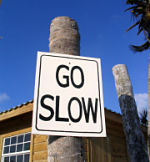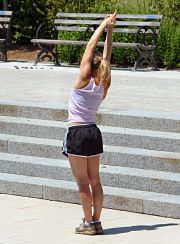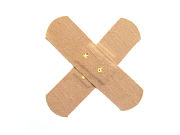Best Running Tips
Everyone has their own best running tips and no doubt as you get into running or back into running, you'll work out what works for you.
The main thing about running is firstly being able to enjoy it and secondly being able to run without injury or stress. Below are some helpful running tips (for new and returning runners) which will help you do just that.
Best RunningTips for Runners
Best running tips #1 - Take it Slow

Beginners:
Taking it slowly to begin with is going to make you a better runner in the long run and it is going to help stop you getting injured. By taking it slowly, I mean running slowly and not running for too long and too often. Your body needs to adapt right from your feet up to your brain.
Running slowly is going to develop your aerobic engine and strengthen your ligaments and tendons which in the long run is going to make you a faster and better runner. When you are running, see if you can talk to a friend or yourself at the same time. If you can't talk comfortably then you are running too fast. Also don't increase your weekly mileage too quickly. A 10% max increase per week is plenty. How to start running as a beginner.
Returning to Running:
Remember you are not 20 years old any more. You might be in your head but unfortunately our bodies often have a different plan.
In many respects you are just like a beginner runner again except that you have more knowledge and experience. Follow the advice for beginners above and soon you'll be back into the swing of it. Getting back into running safely.
Best running tips # 2 - Warm Up and Cool Down

Many runners just head out the door and run. It can feel time consuming and tedious to fit in a warm up. However not doing a warm up is going to increase your chances of an injury and your pace and heart rate are going to be much more erratic.
The aim of a warm up is to warm up your muscles, joints and ligaments in a slow and controlled manner. You want to gradually get your heart pumping more blood and oxygen to your muscles and ligaments so that they are ready for running.
Research now shows that static stretching (where you stretch a muscle as far as you can and then hold it for period of time) is not good for you and not necessary. Far better to do what is called dynamic stretching. These are active movements of your muscles that don't end in a hold period. Examples are swinging one leg at the hip or rotating your arms at the shoulders, rotating your ankles or simply just walking.
Your warm up should ideally be a minimum of 15 minutes and count it as part of your running time. One good way is to walk your first km. Start off slow and gradually increase the intensity of the walk.
Do the reverse as a cool down so that the extra blood has time to move out of your muscles and then doesn't pool and cause swelling.
Best running tips # 3 - Nourish your body

Don't eat just before heading out the door. The food will not have had time to digest and will just sit in your stomach like a lead weight. Here's how to fuel your run.
Try and eat at least an hour and definitely not less than 30 minutes, before you head out the door. Go for something light and digestible such as a couple of eggs on toast or a yogurt and honey.
It's really important to stay hydrated but not over-hydrated. If you are running less than an hour, then you might not need to take fluids along with you, although that depends on the weather. If you do need fluids, don't gulp lots all at once. It's far better to sip every 15 minutes or so as otherwise the fluids will just slosh around in your stomach.
When you get home, drink water within the first 10 minutes to help replenish what you have sweated out and also have something 'healthy' to eat such as a banana or a natural yogurt with honey. If you eat biscuits and refined sugars, they will only fill you up short term and then you'll start looking for more 'unhealthy' sugary snacks.
Best running tips # 4 - Listen to your body

Listen to your body. Runners are notoriously stubborn about recognizing when they have or are heading towards a running injury. Here are the most common running injuries.
There will be days when you feel unwell or parts of your body hurt or perhaps you just haven't got any energy and feel tired. The dilemma is knowing should you or shouldn't you run. Follow these guidelines:
- If you have a fever, don't run.
- If you feel lethargic, go for a run. Running is a great way to clear your head and too give you a bit of energy.
- If something hurts a little when you run, run a bit more gently and try and work out what is causing the pain. Are your laces too tight or did you twist your knee?. If the pain is severe, alters your stride or keeps coming back then definitely take a day or two off then try again.
- Trust your gut. If something feels not right, then perhaps it isn't.
- If in doubt and it's really bothering you, then go and see your doctor.
Best Running Tips - Where to next?
You might also like:
- How to Breathe while Running
- Running Safety
- Running vs Walking - which is better?
- Fueling and Hydrating your Run
